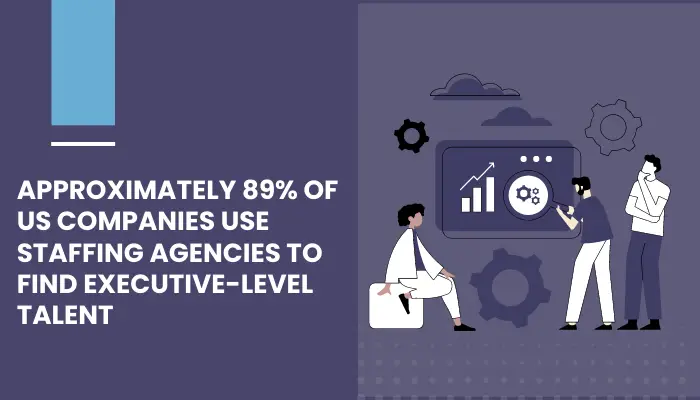Staffing is an essential aspect of any organization, as it is the process of hiring, training, and managing employees. It is crucial to have the right people in the right positions to ensure that business operations run smoothly and efficiently. There are several advantages to proper staffing, such as increased productivity, enhanced employee morale, and improved customer service.
However, there are also some disadvantages that need to be considered, such as high recruitment costs, potential turnover rates, and the risk of hiring the wrong person for the job. In this article, we will explore the advantages and disadvantages of staffing and help you understand the importance of proper staffing for your organization.
So, whether you are a business owner, a manager, or an HR professional, read on to discover the pros and cons of staffing and how to make the most of your staffing strategies.
💡 Helpful Statistics About Staffing:
● During the course of a year, America’s staffing companies hire over 14.5 million temporary and contract employees.
- Most staffing employees (73%) work full time, comparable to the overall workforce (75%).
● More than half (52%) of hiring managers say one of their main challenges in the recruiting process is gaining access to candidates with
the right skills. (Career Builder)
● In the U.S., there are around 25,000 Recruiting and Staffing Agencies. (American Staffing Association)
● Temporary employees make up about 2.1% of the U.S. workforce, which equals roughly 3.1 million people.
● 3.6 million Temporary Employees are Hired Every Year
● 64% of Staffing Agencies Believe Remote-Jobs will be More Common Post-COVID-19
● There are About 25,000 Recruiting and Staffing Agencies in the U.S.
● Approximately 89% of US companies use staffing agencies to find executive-level talent.

Table of Contents
Advantages of Staffing
Cost Savings through Staffing
One of the most significant advantages of staffing is cost savings. By outsourcing staffing to a third-party provider, businesses can save money on recruitment costs, employee benefits, and training expenses. Staffing agencies have a network of qualified candidates, and they can quickly find the right person for the job. This saves businesses the time and money required for in-house recruitment and training. Additionally, staffing agencies often offer temporary or contract staffing services, which allow businesses to flexibly adjust their staffing needs according to seasonal or project-based requirements. This flexibility can help businesses avoid overstaffing and reduce labor costs.
Increased Flexibility with Staffing
Staffing also provides increased flexibility for businesses. Temporary or contract staffing allows businesses to quickly adjust their workforce based on their needs. This can be beneficial for businesses that experience fluctuations in demand or need to ramp up their workforce quickly. Staffing agencies can provide businesses with qualified candidates who can step in immediately, reducing the time and cost required for recruitment and training. Additionally, staffing agencies can provide businesses with specialized skills and expertise, such as IT or accounting, that may not be available in-house.
Access to Specialized Skills and Expertise
Another advantage of staffing is access to specialized skills and expertise. Staffing agencies have a network of qualified candidates with various skills and experience levels. This allows businesses to find the right person for the job, even if the required skills are not available in-house. Staffing agencies can provide businesses with candidates who have experience in specific industries or technologies, allowing businesses to benefit from specialized expertise without investing in training or development.
Disadvantages of Staffing
Higher Labor Costs with Staffing
While there are many advantages to staffing, there are also some disadvantages that need to be considered. One of the main disadvantages of staffing is higher labor costs. Staffing agencies charge a fee for their services, which can increase labor costs for businesses. Additionally, temporary or contract staffing may require higher hourly rates to compensate for the lack of benefits and job security. Businesses need to carefully consider the costs associated with staffing and ensure that the benefits outweigh the costs.
Limited Control over Staffing Employees
Another disadvantage of staffing is limited control over staffing employees. Staffing agencies are responsible for recruiting, hiring, and managing employees, which can limit a business’s control over the workforce. This can be problematic if the staffing agency hires employees who do not align with the business’s culture or values. Additionally, businesses may not have direct control over the training and development of staffing employees, which can impact the quality of work produced. Businesses need to ensure that staffing agencies align with their values and provide sufficient training and development opportunities for staffing employees.
Potential for Cultural Clashes with Staffing
Lastly, staffing can lead to cultural clashes within a business. Staffing agencies may not fully understand a business’s culture, which can lead to conflicts between staffing employees and in-house employees. Additionally, staffing employees may not feel as committed to the business’s mission and values, leading to lower employee morale and job satisfaction. Businesses need to ensure that staffing agencies understand their culture and values and provide sufficient support to staffing employees to ensure they align with the business’s mission.
Conclusion and Recommendations for Staffing Use
In conclusion, staffing has its advantages and disadvantages, which businesses need to carefully consider before implementing a staffing strategy. While cost savings, increased flexibility, and access to specialized skills and expertise are significant advantages of staffing, higher labor costs, limited control over staffing employees, and potential cultural clashes are significant disadvantages. Businesses need to carefully consider the costs and benefits of staffing and ensure that staffing agencies align with their values and provide sufficient training and development opportunities for staffing employees. By making informed decisions about staffing, businesses can ensure that they have the right people in the right positions to drive their success.

